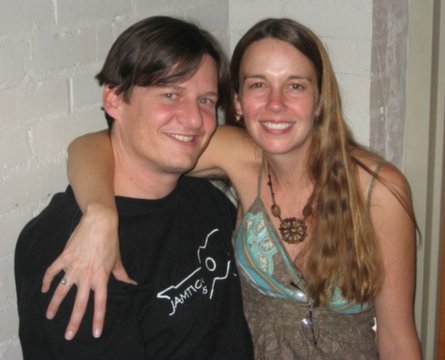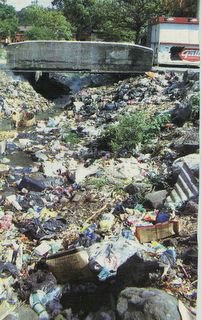
One of the more irritating problems of Guatemala is the attitude of many that the entire world is a giant garbage can. We feel bad for the people who depend on the water from this unbelievably polluted creek.
Perspective
Let it be noted that we certainly didn’t come to Guatemala because we think this would be a great place to spend the rest of our lives. Despite the rant (below) about U.S. politics, we recognize that parts of the U.S. are possibly some of the best places to live that we can imagine, if you can earn enough money to afford them. The incredible music and arts scenes around the U.S. are endlessly inspiring to us, especially in the cultural hotspots of San Francisco, New York, New Orleans, Portland, Seattle and Chicago. For much of this amazing culture, we can give special thanks to the various far-flung remnants of the cultural revolution of the late 1960s, as well as to the wide-ranging diversity introduced by immigrants from all over the world.
Guatemala, on the other hand, is a war-torn and poverty-ridden country, and this is obvious in many aspects of Guatemalan life and culture. In some ways you can feel a kind of gloomy fear and weary sadnes in the air. To add to this, Guatemala doesn't use daylight savings time, so the sun goes down by 7:15 even on the longest days of summer - this is certainly not the festive and laid-back atmosphere of the Spanish and French riveras, for instance. (UPDATE: On April 20, 2006, we read in a Guatemalan newspaper that the country will start using daylight savings time for the first time in its history, starting on April 29, 2006)
Living in Guatemala has certainly given us a new perspective on many aspects of the U.S. that we have often taken for granted. Besides benefiting from a relatively effective justice system (even with its notable warts, it’s far better than what many countries enjoy), it is certainly much easier to enjoy a high standard of living in the U.S. than it is in many countries. For one thing, there is a much lower standard for sanitation in “developing” countries; hot water from the tap is almost non-existent, and occasionally the cold tap water is downright scary. (At least we have tap water here, unlike many people in Africa and South Asia! Also bottled water is widely available.) Stomach ailments of various types are common for most foreigners and Guatemalans alike. Needless to say, technology such as home PCs and high-speed Internet is prohibitively expensive for most Guatemalans.
These kinds of inconveniences can certainly be a bit trying, but they are easy to overcome and for the most part have no major impact on our states of mind. More annoying aspects of Guatemala in fact (and much of Central America, we imagine) are the ever-present black clouds of noxious exhaust in the streets (vehicle emission controls don't exist here, and it's painfully obvious), as well as the endless honking of car horns (drivers are much more obnoxious than in New York, if you can believe) and the ubiquitous trash thrown on the ground and in the streets by Guatemalans who have no concept of a litter-free landscape. Slowly, we're getting used to these annoyances as well.
Needless to say, Guatemala is no paradise, despite its many tourist attractions. The reasons we’re here in Guatemala, then, are not so much to escape the U.S. as they are in personal development. This adventure is about gaining perspective, learning about the world and making a positive contribution to it, and enriching our souls with travels and experiences in interesting and beautiful new environments. And in the context of Latin America, Guatemala is particularly ideal as a starting point for Rob, as it’s one of the cheapest places in the world to learn Spanish.
Despite the trials and tribulations, our new situation has been really rewarding on a number of levels. For one thing, we are learning to make a transition to a more simple lifestyle, with a much lower level of stress than we've been accustomed to in the past. In the process we feel we're learning to take better care of ourselves for the future. What's more, it feels good to challenge ourselves in a way that is outside the mainstream ideal of US culture, and to know that we can succeed and thrive in such an endeavor. In general, the change of scenery and lifestyle has been really good for our states of mind.
We can't imagine staying in Guatemala for more than a year though, as it's not our ideal blissful home sweet home for eternity or anything. Besides, there are so many other places and cultures to explore!
CRIME IN GUATEMALA
Some of you may have read about some of Guatemala’s horrific violent crime statistics. In fact, there’s quite a bit of truth to the fact that Guatemala has major crime problems.

The security guards in Guatemala carry shotguns, and you can see them in front of every bank in the country. Furthermore, you'll also find them guarding delivery trucks, many clothing stores, and even McDonalds!
What’s more, the government is so ineffective that less than 3% of violent crimes (rape, murder) are even investigated. Naturally, only a small fraction of those are ever solved. As a result of this ineffectiveness, it’s not uncommon for local communities to take justice into their own hands, and reports of rural villagers lynching suspected criminals are a somewhat regular occurrence.
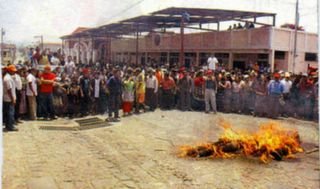
This lynching occurred recently in a town near the capital, on April 19, 2006, when an out-of-town couple suspected of being behind a recent wave of child kidnappings was beaten, covered with gasoline and set on fire. The photo is scanned from the Guatemalan newspaper Prensa Libre. Read more about it here.
However, most of the violent crimes tend to be committed against Guatemalans, since the police tend to actually conduct real investigations when these crimes are committed against tourists – especially white tourists. In general, tourists do need to be wary of being robbed. This is especially a concern in the more remote areas, such as when hiking popular volcanoes or walking on an un-crowded beach. Occasionally we hear about bandidos (bandits) operating on some of the more rural roads. It is especially not advisable to drive in these areas at night.
The most egregious violent crimes usually occur in the capital, Guatemala City. Like most Central American capitals, Guatemala City is a sprawling, over-populated cesspool of poverty, pollution, traffic and crime. Guatemala City has vast tracts of decrepit slums, and these areas are generally the territory of the maras.

A pandillero (gangster) from one of Guatemala's vicious maras (note: photo is from an on-line news source, not from our camera)
One of the biggest problems in many Central American capitals is the presence of the maras, which are violent gangs that are often heavily involved in arms and drug trafficking. In Guatemala, these gangs often act with complete impunity, occasionally even going so far as to assassinate judges who are overseeing trials of high-ranking gang members. According to local newspaper accounts we’ve read, over a third of Guatemala City’s slums are under complete control of the maras. In these areas, they operate like mafias, extorting ransom from every business owner, home owner, car owner, student and bus driver that dares to enter or live in these areas. It is estimated that these gang members number around 10,000 individuals. Recently imprisoned members of rival gangs staged riots in seven Guatemalan prisons, attacking each other with grenades, guns and knives, killing at least 31 people. (How did they get grenades into the prisons?) At least the maras in Guatemala are not not machine gunning buses full of people, as they did in Honduras last December (in San Pedro Sula).
There are many other bizarre crime operations that we’ve read about in local papers here. For instance:
- a prison whose warden was completely under the control of a rich and powerful criminal lord who was supposedly only an inmate
- an extortion ring operating from various prisons; the perpetrators obtained cell phones and copies of phone books, and they dial people’s home phone numbers from their prison cells, demanding that the people they’re calling pay a large sum of money or their family members will be killed. These criminals reportedly work in concert with associates outside the prison to collect their ransom and to occasionally even carry out their threats.
- highway bandits who steal fuel trucks at gunpoint, then drive the fuel trucks to gas stations whose owners are in cahoots with the bandits. The profit from the fuel in the truck is split between the gas station and the bandit, while the multinational fuel company (Exxon, Shell, etc) gets screwed and their truck gets abandoned on the side of the road somewhere. Recently there was a huge protest of fuel truck drivers demanding more security.
Overall, we’re grateful to live in Xela, which despite being a relatively big city has a generally low rate of crime. We almost never hear about violent crime here, but when we do walk in the outlying areas around the city, we usually have Kina with us – it’s actually kind of nice that many people here are terrified of dogs!
AN OVERVIEW OF GUATEMALAN POLITICS
First, A Bit About Where We Come From
As most of our friends and family are aware, we are quite unhappy with many things about U.S. politics. In particular, we would love to see the current U.S. President impeached for his unconstitutional and illegal actions, especially lying to justify war, as well as radicalizing the Justice Department and abusing the human rights of thousands of political prisoners without evidence or any semblance of justice.

In general, we both feel the entire U.S. federal government is deeply corrupted. Thanks to the massive influence of corporate lobbyists pouring corporate money into our politicians’ and judges’ pockets, our government is constantly trying to change U.S. laws to favor the minority (corporate executives) at the expense of the majority (average American taxpayers). (read more here) In addition to creating a farce of a democracy, this situation is further widening the gap between the rich and the poor, while decimating the middle class. Further, the government is not at all responsive to public concerns about dwindling natural resources and toxic pollution and its associated health risks, because protecting the public from these very serious threats would ostensibly cut into the profits of the corporations who are paying off our politicians. Of the 2 major parties, the Republican Party is clearly the more despicable in our minds.
Most people probably have no idea about this, but when our politicians are not busy “fixing” the laws for their corporate benefactors, they spend most of the year “dialing for dollars”, calling more corporate benefactors and trying to raise money for their respective political parties and for their next re-election campaign. According to the Center for Public Integrity, the average politician spends more than ¾ of their work time in Washington “dialing for dollars”. The problem is, if the politicians don’t do this, they can’t be re-elected. Unless the U.S. government gets serious about reforming corruption and campaign finance, we don’t anticipate things getting better in the U.S. anytime soon.
Guatemala – A Shining Beacon of Hope?
Hardly. We harbor no illusions that Guatemala offers some sort of reprieve from corrupt governance. A more progressive and reasonably less corrupt country might be Costa Rica, for instance. Of course, that’s not why we’re here.
Guatemala has a long history of corrupt oligarchy (governance by and for the rich minority) that continues right into the present day. Guatemala’s last president, Alfonso Portillo, fled the country in shame after it was discovered he had embezzled close to $100 million from the government, and he is currently in exile in Mexico City while the current Guatemalan government is demanding his extradition.
Thanks to a brutal civil war that lasted from around 1960 until 1996, the corrupt oligarchy has been interrupted by several periods of military dictatorship. The war was triggered by (surprise!) U.S. foreign policy. In 1954, near the peak of the “Cold War”, the CIA funded and led a small faction of Guatemalan military men to overthrow the elected government. (You can read all about Operation PBSUCCESS at http://en.wikipedia.org/wiki/Operation_PBSUCCESS and http://www.gwu.edu/~nsarchiv/NSAEBB/NSAEBB4/index.html)
The pretense for the coup was “fighting communism”, of course…even though the government that the U.S. was throwing was not really communist. Rather, the admittedly leftist government was simply trying to enact progressive reforms, such as trying to end the horrible treatment (practically slavery) of the indigenous Mayans, and trying to force U.S. multinational corporations to pay the taxes they owed. For many years prior, Guatemala was a dictatorship whose elite rulers were corrupted by U.S. corporations, especially United Fruit Company (now Del Monte). When the dictatorship was overthrown by a series of popular revolts in 1944, the population overwhelmingly elected a “socialist” president, Juan Jose Arevalo, with 85% of the vote.
For 10 years, Guatemalans enjoyed a truly democratic government that tried to serve the will of the majority, of whom where mostly poor peasants. However, when Arevalo’s elected successor, Jacobo Arbenz, tried to force United Fruit Company to pay back taxes and give up some its massive land-holdings, the U.S. government stepped in. Why would the U.S. government care about a behemoth fruit company that also happened to own all of the Guatemalan railways and ports? Perhaps it was because the director of the CIA, Allen Dulles, was sitting on the board of directors for the United Fruit Company??? Hmmmm...
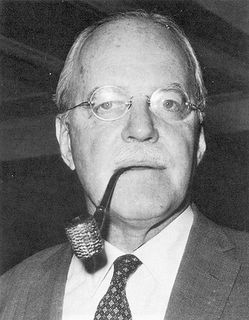
Allen Dulles, a key shareholder in the controversial United Fruit Company and head of the CIA from 1953-196.
Regardless of what anyone thought about the coup, the ensuing military dictatorship led to 40 years of undeniably brutal war. Soon the labor and peasant organizations were outlawed, and many union leaders and political activists were simply executed by the government. This led to several groups going underground and taking up arms, eventually assassinating wealthy plantation owners who were practically enslaving their peasant workers with horrendous working and living conditions.
Soon a cycle of violence escalated. By the mid-1970s, the Guatemalan army was going into indigenous Mayan villages and simply massacring everyone they could find. Some of the survivor accounts of these massacres are truly gruesome! Eventually US president Carter imposed sanctions on the Guatemalan government because of colossal human rights violations; however as soon as the myopic Reagan was elected, he lifted the sanctions and increased military funding to Guatemala’s ruling generals, and the massacres continued.
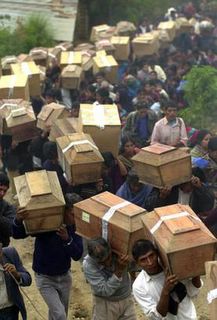
Indigenous Mayans carry the coffins of the victims of a 1982 massacre, in a remote village called Xiquin Sanahi, Comalapa, 73km southeast of Guatemala City. The bodies of 66 people were exhumed from at least six different mass grave sites.
By the time the Peace Accords were signed in 1996, nearly 200,000 people were killed or disappeared, with over 90% of them killed by the government or government-sponsored paramilitaries. In addition to indigenous Mayan peasants and guerrillas, there were tens of thousands of assassinations of politicians, lawyers, judges, union leaders, students, teachers, professors, and even church leaders. If a person dared to speak out against what the government was doing, they were considered to be sympathizing with the enemy and taken out accordingly.
Today the country is mostly at peace. The peasant-guerrilla groups have been re-integrated to society, and the Guatemalan military has been severely restrained. However there are still a number of organizations trying to prosecute the perpetrators of the massacres and gross human rights violations, and these groups are quite often subjected to death threats, bombings, and even murders. Clandestine paramilitaries apparently still operate in the country, most likely paid by corporations and a tiny minority of very wealthy landowners.
However, there is still a long way to go to truly achieve social justice. The majority of the Guatemalan people live in extreme poverty, and there is an enormous gap between rich and poor. Over 80% of the arable land is owned by less than 3% of the population that includes a wealthy elite and multinational corporations. In the mostly indigenous western highlands where we live, many of the campesinos try to continue their traditional way of subsistence farming by carvimg out tiny plots on what seem to be impossibly steep slopes of mountains and volcanoes, just so they can support their families.
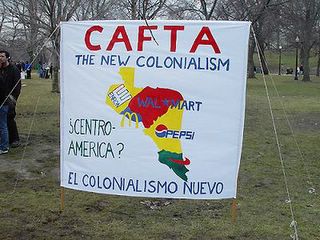
Many people here are not in favor of CAFTA, mostly for the favoritism it bestows on multinational corporations at the expense of both local small businesses and campesinos.
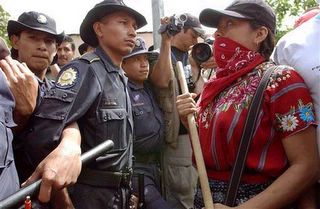
Police and anti-CAFTA protesters come face to face (note: photo is from an on-line news source, not from our camera)
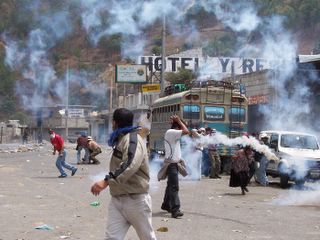
Things get ugly at the protest... (note: photo is from an on-line news source, not from our camera)
While racism is not nearly as bad as it used to be, it still persists. The indigenous Mayans especially still face various discriminations, particularly in restaurants, cafes, schools, and places of work. Nevertheless, the Mayans constitute the majority of the people in Guatemala at just over 50%. In Xela, the Quiche Maya constitute over half of the population, and you see them just about anywhere and everywhere, the women especially distinctive in their colorful traditional dresses. While the Mayans are allowed to vote now, polls show that most of them don’t bother to participate in the political process anymore, due to the widespread belief that the government is hopelessly corrupt.
The current president of Guatemala is Oscar Berger, pronounced the French way, like “ber-JZAY”. He’s another right-winger, pimping neo-liberal free-trade philosophies against the wishes of the majority of Guatemalans. Typically, he won an election in which less than 40% of the population bothered to vote.
On to the Guatemalan Weight Loss Diet!
Strange sights in Guatemala
